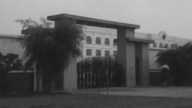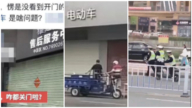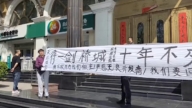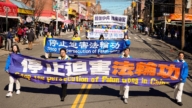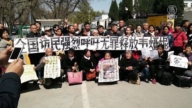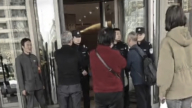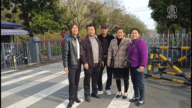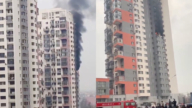【新唐人2012年7月5日讯】《纽约时报》中文网4号刊登评论员文章《什邡事件拷问中国环评机制》,作者认为,过去30多年中,中国虽然取得了经济的高速增长,但却付出了惨重的生态代价,在财富分配上,也造成了实质的不公平。
报导说,烟雾弥漫的天空、污染的河流以及有毒食品已经成为全国性的问题,在这样的大背景下,什邡开采钼铜的矿厂项目似乎触动了全国民众的神经。尽管审查人员似乎采取了删帖措施,什邡抗议还是成为了周二的新浪微博上最热门的搜索主题。
据大陆媒体报导,什邡市委书记7月3号下午表示,决定停止这个项目的建设。
不过,3号,什邡警方发布警告,他们将“严厉惩罚”任何继续进行抗议的人。当局还禁止民众使用网络、手机短信和其他形式的通讯手段组织抗议活动。
而《纽时》的报导说,什邡政府的通告并没有明确表示矿厂是否会恢复建设。市政府声称已开通热线电话和邮箱来解答与这个项目有关的问题,同时促进对项目的所谓“正确理解”。报导说,这似乎暗示,这个项目的建设工作将来会继续进行。
“什邡大冲突”媒体人齐怒吼
北京知名摄影记者陈杰微博上披露说:“什邡事件,我知道有诸多媒体记者,以职业的本能迅速抵达现场,不过,他们所供职的媒体最终只能是旁观者,他们的无力,不是因为没有采访到真相,而是,被迫噤声。最终,是公民利用网络,一起完成了这个事件的报导,最迅速、最现场、最详实,当然,这里面也有很多记者转身做网民,顶着压力发声。”
大陆的《中青报》7月4号刊登评论文章——《有些事,无法假装看不见》,评论说,有些事情,网络上议论纷纷,微博有图有细节,有当事人诉说、有旁观者描述,可传统媒体竟不见半句报导。
而《东方早报》、《南方日报》等新浪官方微博都转载了《中青报》的要点。《南方都市网》在新浪认证的官方微博上也发出怒吼说:“今天,什邡的特警敢向人民动武,敢打女人和孩子;明天,你我生活的地方特警,就敢对你我动武。今天你不说话,明天,你我就可能被武装枪杀!我们,必须谴责他们,必须依法惩办肇事者!必须有人为这次恶性事件负责!”
《经济观察报》发表评论认为:“什邡政府,一边是武装力量驱逐抗议者,一边是息事宁人地宣布顺应民意、停止项目,看上去相当精神分裂。为啥强力控制局势了,反而在实质问题上低头?官方也害怕进一步激化矛盾,把民众逼到‘不畏死’的阶段。简单说,官方对于暴力本身已经心中无底了。”
新唐人记者周平报导
Shifang City Questions China’s EIA Mechanism
On July 4, the New York Times’ Chinese website published
a commentary, titled:
“The Shifang Protest Questions China’s
Environmental Impact Assessment Mechanism."
The article argues that though China has had rapid economic
growth in the past 30 years, it has come at high ecological costs.
The country has also seen substantial injustices
in social wealth distribution.
Beyond the nationwide smoggy skies,
polluted rivers and toxic food,
Shifang’s molybdenum copper project seems to have hit
upon the nerves of the Chinese civilians, said the article.
While even with the web censors’ removal of
the online postings,
the Shifang protest still topped the heated topics
on Sina’s Microblog on Tuesday.
According to China’s media, on July 3, the Shifang
authorities announced a halt to construction on this project.
However, that same day, the Shifang police issued a warning
notice stating that anyone who continues to protest will be “severely punished."
Local people have also been banned from using the internet,
SMS and other forms of communication to organize demonstrations.
The New York Times’ article commented that Shifang’s
official announcement hasn’t specified whether the project’s construction will be resumed.
An official hotline and mailbox were allegedly opened to
answer questions and help people to “correctly understand"the project.
This seems to be implication that the project’s construction
will go on in the near future, said the commentary.
Chinese Media Cry Out for The Shifang Incident
Renowned Beijing-based photographer, Chen Jie, said on
his Micro-blog: “As I know, a lot of journalists swiftly arrived on the scene in Shifang.
But the media outlets they work for will only serve
as bystanders.
This is not due to their failure to explore the truth,
but rather due their being muzzled.
In the end, citizens, via the internet, concertedly finished
the reportage—which ended up being the quickest,
most detailed and accurate news report [on the issue].
Actually, many of these netizens were journalists,
who spoke out under pressure. “
On July 4, the China Youth Daily published a review article
titled, “Some Things, We Just Cannot Pretend to Ignore."
The article commented that proof of some hot topics
are often discussed on after another on the internet,
some bloggers even post photos, along with detailed
descriptions by participants and witnesses.
Yet, these news items go unreported by the traditional media.
Dongfang Daily and Nanfang Daily have reproduced
this view on their official Microblog blogs.
The official Microblog blog of Nfdsw.com said:"Today,
in Shifang, the SWAT police dared to beat women and children;
tomorrow, the SWAT police will dare use violence
against you and me in our living places.
Today, you keep silent; tomorrow, you and I may be
shot to death by the armed forces. We must condemn them.
The perpetrators must be brought to justice!
Someone must be liable for this vicious incident!"
The Economic Observer commented, “Shifang’s government
looks quite schizophrenic.
On one side, it used armed forces to disperse the protesters;
on the other, it claimed to heed public opinion and stopped the project.
Why did it yield on the core issue after having controlled
the situation?
The authorities are also afraid of seeing the conflict intensify,
—driving the masses into a state of ‘not fearing death.’
Simply put, the government has no guarantee that
it won’t resort to violence."


